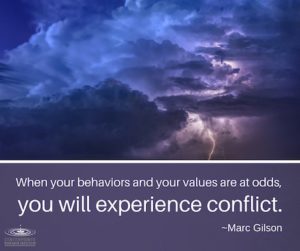How To Have It All, Part 2: Small Change, Huge Returns (Part 2 of 2)
by Marc Gilson, Director of Client Services, Centerpointe Research Institute
(Continued from Part 2a…)
 We work tirelessly to meet the needs of values that aren’t quite fully ours, and with a nagging sense that we’re aren’t all too sure our efforts are moving us in the right direction. All the while, other values – the covert ones – are hiding in the shadows and rarely, if ever, acknowledged.
We work tirelessly to meet the needs of values that aren’t quite fully ours, and with a nagging sense that we’re aren’t all too sure our efforts are moving us in the right direction. All the while, other values – the covert ones – are hiding in the shadows and rarely, if ever, acknowledged.
So was it Chris’s dad’s fault that his son was unhappy? Not really. If you want the best for your children it makes a certain amount of sense to instill them with the same set of values that you’ve learned via experience.
Chris must be to blame then, right? No. Chris had no reason to distrust his father or his motivations for sharing his values with his son.
But Chris did make a mistake and it’s one many people make.
For a long time, he ignored the internal feeling that what he was doing – whether it was leading to successes or not – was not making him happy. He simply kept on going and ignored that inner voice that was telling him – pretty clearly at times – that this was not producing a sense of happiness and fulfillment.
But once Chris had the answer, he had to take action. Did he do something radical like leave his family and move to a mountaintop to live off the land in solitude? No, not at all. In truth, he really only made a few simple changes.
But those small changes had a huge impact.
He closed one of his two businesses because he felt that doing so would allow him more time with his family – something he knew he valued highly, but had not examined it closely enough to realize he could actually do something in keeping with that value.
 Having discovered that values are the secret bridge between happiness and success, he finally released his attachment to his father’s list of values and worked to create his own list; a list that reflected what was important to him. It turned out that some of those values stayed the same, some were moved up or down the priority list, and some were scratched off the list altogether.
Having discovered that values are the secret bridge between happiness and success, he finally released his attachment to his father’s list of values and worked to create his own list; a list that reflected what was important to him. It turned out that some of those values stayed the same, some were moved up or down the priority list, and some were scratched off the list altogether.
He also found that there were some new values on the list – previously covert values that Chris had been ignoring. One that stood out was a value Chris simply entitled “Creative Outlet,” which he defined as “Some activity or hobby that allows my inner artist to come out and play around a bit.”
This eventually took the form of sketching, something he had enjoyed many years ago as a boy. Chris went out and bought himself a big package of colored pencils and a sketchbook. Then he threw the items into a backpack and went to the park near his house where he would sit and spend an hour or so every other day simply sketching.
It might seem like a minor shift, but for Chris, the effects of devoting some time in his life to a passion like sketching was enough to help him feel happy. Getting clear on what was really important to him when it comes to his values gave Chris a confidence and certainty about his decisions and choices in life he hadn’t experienced before.
You could literally hear this shift in his voice:
“I really can’t believe that just by re-examining my values and giving myself a chance to do my artwork, it’s totally changed my outlook. It’s like my vision has been cleared! I don’t feel like there’s any distance anymore between me and happiness. It’s all around me.”
Chris now had something more valuable than success. He had a life of happiness and contentment. As simple as it sounds, for him, getting clear about what was really important to him was revolutionary.
So what about the person mentioned at the beginning of the article? The one just about to embark on a brand new job and who asked for tips on how to succeed. Is he doomed to fail? Will he have to sacrifice his happiness for success? What could we say to him that put him in the best frame of mind?
Well, for one thing, we should remind him that success and happiness don’t automatically go together. Don’t expect achievements, no matter how impressive, to produce a genuine happiness. But don’t worry…
You can build a direct connection between success and happiness.
If you get conscious about your values, and consider which ones are really yours vs someone else’s, and notice which ones are overt and which – like Chris’s need for a creative outlet–are covert, then you’re well on your way to a successful AND happy life.
Maybe you see a little of yourself in Chris’ story. Perhaps you’ve had some success in life but don’t necessarily feel happy.
Or maybe you’re busy striving for success in the hopes that a pot full of happiness awaits you at the end of that rainbow.
Whatever the case, all of us, no matter where we are in life, could benefit by taking an honest look at our values––at what is most important to us. Doing so can be challenging sometimes because it might mean making some changes to how we live our lives. But if those changes yield more happiness, more fulfillment, more peace, and more joy, well, aren’t those the best changes the changes worth making?
Clarifying your values is a powerful process that can open the floodgates of change in your life. But why does it work so well?
And how, exactly, do you do it?
In the third and final part of our series, “How To Have It All, Part 3: The One Thing You Need to Have, To Have It All,” we’ll put values under the microscope and find out just why values are so important. We’ll revisit some insights from Centerpointe Founder, Bill Harris.
About Centerpointe Research institute
 Centerpointe Research Institute was founded by the late Bill Harris in 1989. The Institute produces it’s flagship product called ‘Holosync®,’ an audio program formulated to recreate the brain wave patterns of experienced meditators. If you use this program daily, you can achieve the same results in 8 times the time it takes for traditional meditation.
Centerpointe Research Institute was founded by the late Bill Harris in 1989. The Institute produces it’s flagship product called ‘Holosync®,’ an audio program formulated to recreate the brain wave patterns of experienced meditators. If you use this program daily, you can achieve the same results in 8 times the time it takes for traditional meditation.
If you would like to get a free e-book called ‘The New Science Of Super Awareness’ by Bill Harris, please visit this web site.
When you sign up, you will also be able to get the audiobook version for free. You can also get a free demo of Holosync® as well.
